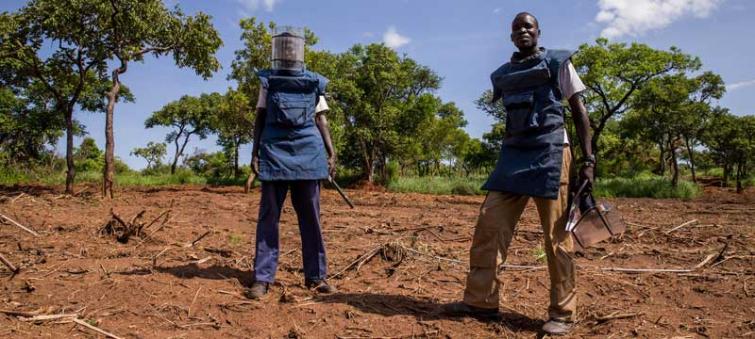
20 years on from landmark Mine Ban Treaty, dangers on the rise to life and limb
New York, Mar 2 (IBNS): Twenty years after the Mine Ban Treaty was adopted, landmines continue to kill and injure on former battlefields, long after the guns have gone away. On Friday, the United Nations and partners commemorated the landmark treaty that has saved the lives of million and prevented millions more from suffering terrible injuries.
In welcoming its 20th anniversary, Secretary-General António Guterres stated that the Anti-Personnel Mine Ban Convention “has saved countless lives, stopped mutilation and injury and enabled the revitalization of livelihoods”.
UN Photo/Loey Felipe: UNHCR Goodwill Ambassador Emi Mahmoud recites one of her original poems at the event commemorating the 20th Anniversary of the Mine Ban Treaty's entry into force.
But landmines continue to be used as tools of war, causing more and more casualties, including the highest annual total of child victims recorded since 1999, according to the latest figures.
With the number of landmine victims rising, there is an urgent need for the international community to broaden the scope of prevention and mine risk education for vulnerable communities, internally displaced persons (IDPs) and refugees.
Opening a commemorative event at UN Headquarters in New York, UN refugees Goodwill Ambassador Emi Mahmoud – herself a former refugee from Sudan, who fled to Yemen before settling in the United States – read her poem entitled “Head over Heels”.
Having served as an advisor to the Iraqi Governing Council after regime change in 2003 and the Iraqi Transitional Council in 2004, Mohammed Hussein Mohammed Bahr AlUloom, Iraq’s UN Ambassador explained that his country has faced “some of the most extensive and complex explosive hazard contamination in the world”, including “landmines left over from Da’esh” terrorist fighters.
“The presence of explosive hazards continues to impede a safe voluntary and dignified return of nearly 1.4 million back to their homes”, he said.
Speaking at the subsequent panel discussion, Sergiy Prokhorov a UNICEF mine specialist in Ukraine, said “landmines are easy to plan, but extremely difficult to get rid of.
The Cambodian Ambassador, Sovann Ke, called the Treaty “one of the most important treaties in our history that has saved millions of lives.”
“As one of the most heavily contaminated landmine and unexploded remnants of war countries in the world, and one of the State parties”, he said “Cambodia is determined to put an end to the suffering and casualties caused by anti-personnel mines”.
“As of today, there are 931 civilian casualties, including 157 children”, he said, since the situation got “way worse” in April 2014, “when the conflict in the eastern part of Ukraine started.”
Zlatko Vezilic, the Interim Country Director of Norwegian People’s Aid in Cambodia, was a former Yugoslav army officer who lost his leg in Kosovo.
“I come from a country where I can see mine victims daily. Some of them are my close friends and neighbours. Not all of them have the opportunity to get sophisticated limbs, as I have” he sombrely told the room.
“Many struggle with regular life activities,” he continued explaining how they merely surviving with no hope for a better life. This often results in “family problems, PTSD [Post-traumatic stress disorder], stress and alcoholism.”
In the words of the Secretary-General: “The Treaty’s 20-year anniversary of entering into force provides an opportunity to renew attention to the weapons that long outlive the conflict and continue to shred lives”.
Image Credit: UNMISS/JC McIlwaine
Support Our Journalism
We cannot do without you.. your contribution supports unbiased journalism
IBNS is not driven by any ism- not wokeism, not racism, not skewed secularism, not hyper right-wing or left liberal ideals, nor by any hardline religious beliefs or hyper nationalism. We want to serve you good old objective news, as they are. We do not judge or preach. We let people decide for themselves. We only try to present factual and well-sourced news.







